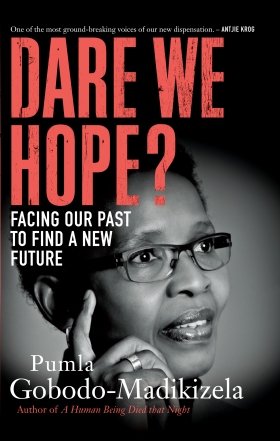 Pumla Gobodo-Madikizela’s collection of articles published between 1995 and 2014 offers a fascinating glimpse into the main issues plaguing contemporary South Africa. A professor in psychology, Gobodo-Madikizela was deeply involved in the proceedings of the TRC and wrote the award-winning A Human Being Died that Night, one of the most relevant and haunting books of recent years. It tells the story of her interaction with Eugene de Kock, the apartheid assassin known as Prime Evil.
Pumla Gobodo-Madikizela’s collection of articles published between 1995 and 2014 offers a fascinating glimpse into the main issues plaguing contemporary South Africa. A professor in psychology, Gobodo-Madikizela was deeply involved in the proceedings of the TRC and wrote the award-winning A Human Being Died that Night, one of the most relevant and haunting books of recent years. It tells the story of her interaction with Eugene de Kock, the apartheid assassin known as Prime Evil.
Gobodo-Madikizela is a leading authority in research on trauma, memory and forgiveness. Many articles in Dare We Hope? focus on remembrance and reconciliation as relating to race, gender and power. Gobodo-Madikizela puts her finger on the insidious everyday ways we work against a common future by “attacking one another…in private and in public”.
Having recognised the seeds of discontent being sown and germinating in our society, Gobodo-Madikizela warns against the next revolution, “one in which the masses rise against a new breed of beneficiaries of privilege.” The “never-ending cycle of nothingness” that is poverty and lack of aspiration “strips away the humanity of individuals.” Unless we can create opportunities for people to lead meaningful lives, we will have no future as a society.
A large section of the book is devoted to dilemmas of leadership and morality. It is an incisive analysis of the “terrible shame”, the “moral rot” of the Zuma years and the terrifying legacy they are threatening to leave behind: “From the beginning, Zuma’s presidency was destined to corrupt the soul of the country.”
Gobodo-Madikizela identifies what is “missing in our democracy”: “a spirit of human solidarity that transcends the commitment to membership of one’s racial group or political party.” Her plea is for a shared humanity, for the understanding and acceptance of our diverse grievances, traumas and complicities, and, crucially, for the triumph of moral responsibility.
The articles in this book repeatedly call for dialogue: “Listening to one another and acknowledging the experience of loss on both sides would be a start.” It is a call for the employment of that wonderful faculty we all have in common: our imagination. It is also a call for moving beyond denial and revenge into a space where guilt can be articulated and forgiveness becomes a lived reality.
Dare We Hope? is an extremely sobering read. Gobodo-Madikizela is under no illusion that what she is narrating is anything but “a gruesome tale”. However, her voice is one of wisdom and, despite all, deep-seeded hope. To ignore her insights and not to heed her warnings could prove detrimental not only to individuals but to society at large. This collection is a much needed reminder that South Africa is in a dire need of more dissenting voices and, even more importantly, true leaders who can lead by example. Gobodo-Madikizela’s vision is a vital contribution in both respects.
Dare we hope? Perhaps. One thing is for certain; a lot of work needs to be done to rekindle the spark of an earlier promise.
Dare We Hope? Facing Our Past to Find a New Future
by Pumla Gobodo-Madikizela
Tafelberg, 2014
The insights of Gobodo-Madikizela helps us to see the truth behind us, in us, with us, and for us. There is no need or time for denial. We need her like-minded bravery and hopefulness to really work and receive a new Africa together.